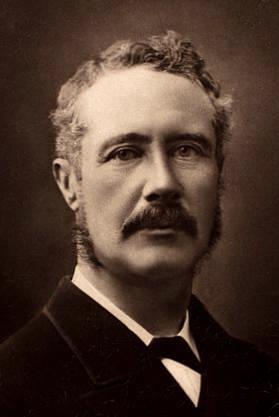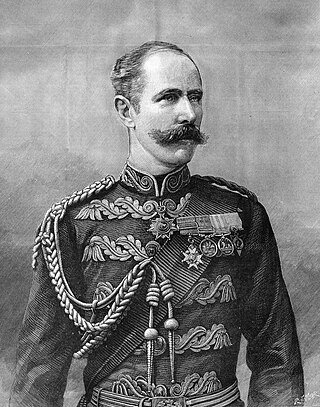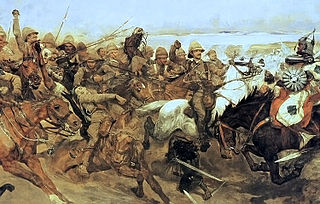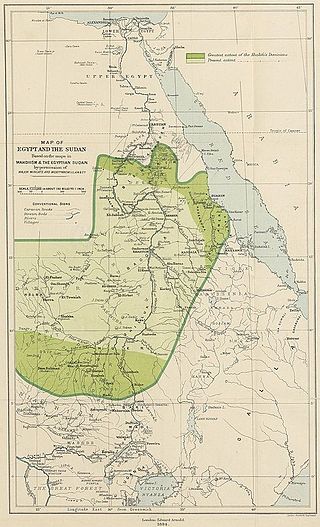Related Research Articles

Major-General Charles George Gordon CB, also known as Chinese Gordon, Gordon Pasha, and Gordon of Khartoum, was a British Army officer and administrator. He saw action in the Crimean War as an officer in the British Army. However, he made his military reputation in China, where he was placed in command of the "Ever Victorious Army", a force of Chinese soldiers led by European officers which was instrumental in putting down the Taiping Rebellion, regularly defeating much larger forces. For these accomplishments, he was given the nickname "Chinese Gordon" and honours from both the Emperor of China and the British.

The Battle of Omdurman was fought during the Anglo-Egyptian conquest of Sudan between a British–Egyptian expeditionary force commanded by British Commander-in-Chief (sirdar) major general Horatio Herbert Kitchener and a Sudanese army of the Mahdist State, led by Abdallahi ibn Muhammad, the successor to the self-proclaimed Mahdi, Muhammad Ahmad. The battle took place on 2 September 1898, at Kerreri, 11 kilometres (6.8 mi) north of Omdurman.

Muhammad Ahmad bin Abdullah bin Fahal was a Sudanese religious and political leader of Nubian descent. In 1881, he claimed to be the Mahdi, and led a successful war against Egyptian rule in Sudan which culminated in the victorious siege of Khartoum. He created a vast Islamic state extending from the Red Sea to Central Africa, and founded a movement that remained influential in Sudan a century later.

The Four Feathers is a 1902 adventure novel by British writer A. E. W. Mason that has inspired many films of the same title. In December 1901, Cornhill Magazine announced the title as one of two new serial stories to be published in the forthcoming year. Against the background of the Mahdist War, young Feversham disgraces himself by quitting the army, which others perceive as cowardice, symbolized by the four white feathers they give him. He redeems himself with acts of great courage and wins back the heart of the woman he loves.

The Battle of Abu Klea, or the Battle of Abu Tulayh took place between 16 and 18 January 1885, at Abu Klea, Sudan, between the British Desert Column and Mahdist forces encamped near Abu Klea. The Desert Column, a force of approximately 1,400 soldiers, started from Korti, Sudan on 30 December 1884; the Desert Column's mission, in a joint effort titled "The Gordon Relief Expedition", was to march across the Bayuda Desert to the aid of General Charles George Gordon at Khartoum, Sudan, who was besieged there by Mahdist forces.

Colonel William Hicks, also known as Hicks Pasha,, was a British soldier who entered the Bombay Army in 1849, and served through the Indian mutiny, being mentioned in dispatches for good conduct at the action of Sitka Ghaut in 1859.

Major-General Sir Herbert Stewart was a British Army officer and English first-class cricketer.

The Battle of Shaykan was fought between Egyptian forces under the command of Hicks Pasha and the forces of Muhammad Ahmad, the self-proclaimed Mahdi, in the woods of Shaykan near Kashgil near the town of El-Obeid during 3–5 November 1883.

Khartoum is a 1966 British epic war film written by Robert Ardrey and directed by Basil Dearden. It stars Charlton Heston as British General Charles "Chinese" Gordon and Laurence Olivier as Muhammad Ahmed, with a supporting cast that includes Richard Johnson and Ralph Richardson. The film is based on historical accounts of Gordon's defence of the Sudanese city of Khartoum from the forces of the Mahdist army, during the 1884–1885 Siege of Khartoum. The opening and closing scenes are narrated by Leo Genn.

The Mahdist State, also known as Mahdist Sudan or the Sudanese Mahdiyya, was a state based on a religious and political movement launched in 1881 by Muhammad Ahmad bin Abdullah against the Khedivate of Egypt, which had ruled the Sudan since 1821. After four years of struggle, the Mahdist rebels overthrew the Ottoman-Egyptian administration and established their own "Islamic and national" government with its capital in Omdurman. Thus, from 1885 the Mahdist government maintained sovereignty and control over the Sudanese territories until its existence was terminated by the Anglo-Egyptian forces in 1898.

The Siege of Khartoum took place from 13 March 1884 to 26 January 1885. Sudanese Mahdist forces captured the city of Khartoum from its Egyptian garrison, thereby gaining control over the whole of Sudan.

The Mahdist War was a war between the Mahdist Sudanese, led by Muhammad Ahmad bin Abdullah, who had proclaimed himself the "Mahdi" of Islam, and the forces of the Khedivate of Egypt, initially, and later the forces of Britain. Eighteen years of war resulted in the creation of Anglo-Egyptian Sudan (1899–1956), a de jure condominium of the British Empire and the Kingdom of Egypt in which Britain had de facto control over Sudan. The Sudanese launched several unsuccessful invasions of their neighbours, expanding the scale of the conflict to include not only Britain and Egypt but also the Italian Empire, the Congo Free State and the Ethiopian Empire.

The Nile Expedition, sometimes called the Gordon Relief Expedition (1884–1885), was a British mission to relieve Major-General Charles George Gordon at Khartoum, Sudan. Gordon had been sent to Sudan to help the Egyptians withdraw their garrisons after the British decided to abandon Sudan in the face of a rebellion led by self-proclaimed Mahdi, Mahommed Ahmed. A contingent of Canadians was recruited to help the British navigate their small boats up the Nile River. The Nile Expedition was the first overseas expedition by Canadians in a British imperial conflict, although the Nile Voyageurs were civilian employees and did not wear uniforms.

The Battle of Kirbekan was a battle in the Mahdist War. It was fought February 10, 1885, when the British Nile Column, about 1,000 strong, under General Earle, stormed the heights of Kirbekan, which were held by a strong Mahdist force, and totally routed them, with heavy loss.

The Battle of Ginnis was a minor battle of the Mahdist War that was fought on December 30, 1885, between soldiers of the Anglo-Egyptian Army and warriors of the Mahdist State. The battle was caused by the Mahdist blockade of the Ginnis-Kosha Fort, which British commanders hoped to relieve.
Korti or Kurti is a town in northern-central Sudan. In the Meroitic period the city appeared as Cadetum, Cadata or Coetum in Roman sources. The town lies about 250 kilometres (160 mi) from Khartoum, on the south side of the Nile at the terminus of the Wadi Muqaddam. It is also known for being the centre location for the Shaigiya tribe.

The Triumph of the Sun is a novel by Wilbur Smith set during the Siege of Khartoum. Smith himself said the following about the novel:
"That incident had all the elements of a great story setting because you have the captive characters who are having to interact with each other because there is no escape – siege conditions. Also the river. I’m fascinated by the great rivers of Africa. Played against that was a sort of island setting in the desert. Then it had such powerful influences at work – the British Empire against the revolting Mahdists, the conflict of religions, Gordon and the Mahdi, both of them totally fanatical, believing that they spoke directly to God, and unbendable and unbending."

The Suakin-Berber railway on the Red Sea coastal region in Sudan was a short-lived military project that never reached completion. Its construction began in February 1885, being intended to provide a connection between Berber on the River Nile and Suakin on the Red Sea littoral for the rapid deployment of troops and military equipment in Britain’s involvement in the Mahdist war.

The Battle of Abu Hamed occurred on 7 August 1897 between a flying column of Anglo-Egyptian soldiers under Major-General Sir Archibald Hunter and a garrison of Mahdist rebels led by Mohammed Zain. The battle was a victory for the Anglo-Egyptian forces, and secured for the British the strategically vital town of Abu Hamed, which was the terminus for trade and transportation across the Nubian Desert.

The Anglo-Egyptian conquest of Sudan in 1896–1899 was a reconquest of territory lost by the Khedives of Egypt between 1884 and 1885 during the Mahdist War. The British had failed to organise an orderly withdrawal of Egyptian forces from Sudan, and the defeat at Khartoum left only Suakin and Equatoria under Egyptian control after 1885. The conquest of 1896–1899 defeated and destroyed the Mahdist State and re-established Anglo-Egyptian rule, which remained until Sudan became independent in 1956.
References
- ↑ Cromer, Earl of (1908). Modern Egypt. Macmillan. p. 564. ISBN 1108025536.
- 1 2 3 Brackenbury, Henry (1885). The River Column. W. Blackwood.
- Featherstone, Donald (2013). Khartoum 1885: General Gordon's last stand. Bloomsbury Publishing. ISBN 978-1-4728-0384-9.